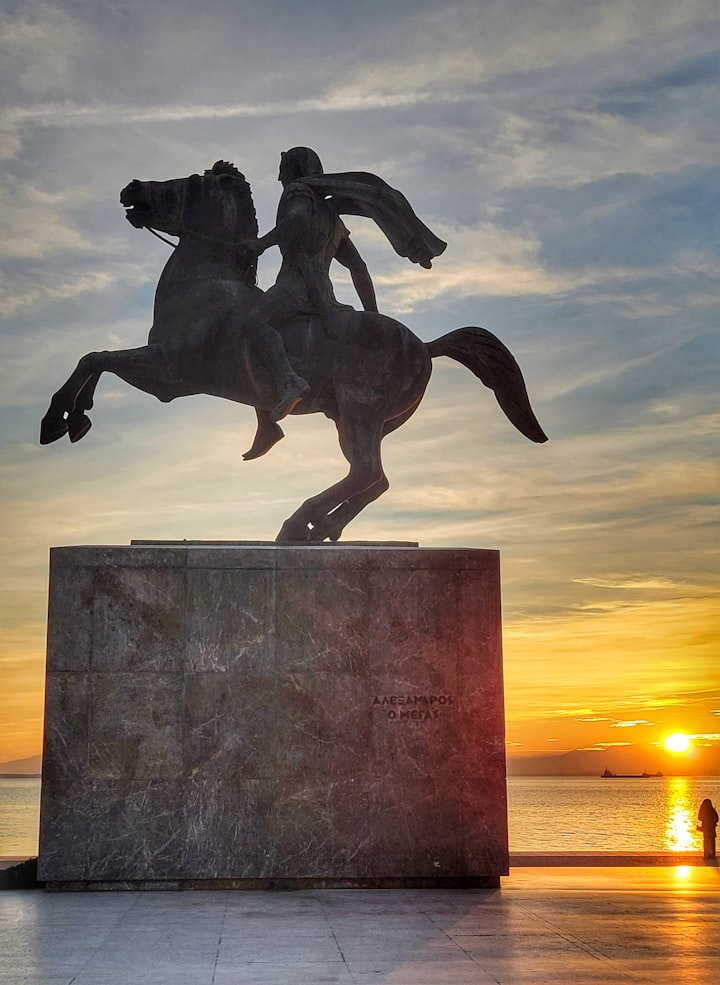Alexander the Great
The Conqueror Who Shaped the Ancient World

Alexander the Great, a legendary figure in history, was a Macedonian king who left an indelible mark on the ancient world. Born in 356 BCE, Alexander's reign lasted a mere 13 years, but his military prowess and strategic brilliance propelled him to conquer vast territories from Greece to Egypt, Persia, and India. This article delves into the life, achievements, and lasting impact of Alexander the Great, shedding light on his leadership, military campaigns, cultural influence, and his enduring legacy.
Alexander, son of King Philip II of Macedon and Queen Olympias, inherited a strong military tradition. From an early age, he showed exceptional leadership skills and a thirst for knowledge. As a student of the renowned philosopher Aristotle, Alexander gained a deep appreciation for Greek culture, philosophy, and literature, which would later influence his rule.
Following his father's assassination in 336 BCE, Alexander ascended to the throne at the tender age of 20. Determined to continue his father's vision of expanding the Macedonian Empire, Alexander quickly consolidated his power and embarked on an ambitious campaign of conquest.
One of Alexander's most notable achievements was his conquest of the mighty Persian Empire. In 334 BCE, he led his army across the Hellespont and launched a series of decisive victories against the Persians. The battles of Granicus, Issus, and Gaugamela showcased his strategic brilliance, as well as the loyalty and discipline of his troops. By 330 BCE, Alexander had effectively dismantled the Persian Empire, proclaiming himself as the rightful ruler of Asia.
Not content with his conquests in Persia, Alexander set his sights on India, seeking to expand his empire even further. The Indian campaign was fraught with challenges, as Alexander faced formidable opponents and grueling conditions. Despite these obstacles, he displayed extraordinary resilience and determination. His encounters with Indian kingdoms, particularly the Battle of Hydaspes against King Porus, demonstrated his military genius. However, the campaign's toll on his troops and his own health eventually compelled him to turn back.
Beyond his military triumphs, Alexander's cultural and intellectual impact on the ancient world cannot be overstated. As he conquered new lands, he sought to bridge Greek and local cultures, encouraging the exchange of ideas, customs, and knowledge. This Hellenistic influence left an enduring legacy in architecture, art, literature, and philosophy. The city of Alexandria, founded by Alexander in Egypt, became a center of learning and intellectual pursuit, boasting the famous Library of Alexandria.
Alexander's leadership style played a pivotal role in his successes. He led from the front lines, inspiring his soldiers with his courage and leading by example. His ability to adapt to changing circumstances, delegate authority, and inspire loyalty among his troops earned him unwavering support. However, his relentless ambition and desire for conquest also led to instances of ruthlessness and a failure to establish a stable governance structure in the conquered territories.
Despite his relatively short reign, Alexander's influence on the ancient world was profound. His empire served as a bridge between Eastern and Western civilizations, facilitating the spread of Greek language, culture, and ideas. The concept of the "Great King" that Alexander embodied influenced subsequent rulers and empires, such as the Seleucids and the Romans. Even after his death in 323 BCE, his legacy continued to shape the course of history, leaving an indelible mark on the world.
Alexander the Great's meteoric rise, unparalleled military achievements, and visionary leadership have firmly established him as one of history's greatest conquerors. His legacy, spanning military tactics, administrative reforms, and cultural diffusion, continues to captivate scholars and enthusiasts alike. Alexander's impact on the ancient world and subsequent civilizations cannot be overstated, shaping the course of history and leaving an enduring mark on the collective human imagination.
About the Creator
Robin Raikwar
Versatile writer with a passion for storytelling. Captivating readers with words, blending creativity and precision. Adapts to various genres and delivers engaging content.
Enjoyed the story? Support the Creator.
Subscribe for free to receive all their stories in your feed. You could also pledge your support or give them a one-off tip, letting them know you appreciate their work.






Comments
There are no comments for this story
Be the first to respond and start the conversation.